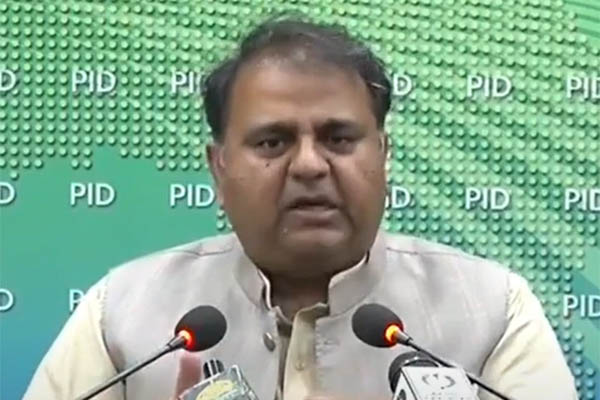
File photo of Information Minister Fawad Chaudhry. YouTube
Pakistan’s information minister says government wants to work with ‘disgruntled’ Baloch leaders; alleges discovery of ‘second-biggest’ Indian terror network
The federal cabinet has decided to establish refugee camps along the Pak-Afghan border to facilitate any potential influx of Afghan refugees into Pakistan in the wake of deteriorating security conditions in the neighboring state, Information Minister Fawad Chaudhry said on Tuesday.
Addressing a press briefing, he said that the cabinet had decided to prevent refugees from leaving the border areas and entering the rest of the country. “Due to international obligations we have to accommodate Afghan refugees if they seek refuge in Pakistan due to war in their country,” he said, but stressed this did not extend to accommodating in the country’s urban centers.
Referring to a statement of Prime Minister Imran Khan in which he had expressed willingness to talk with Baloch insurgents, the minister said that this offer would not apply to any groups that had links with India or were involved in unrest. “Balochistan is close to Imran Khan’s heart,” he said, adding that it would soon emerge as a “cradle of peace” in the country.
India network
Chaudhry claimed law enforcement agencies had unearthed the “second-biggest” Indian-sponsored terror network—after convicted Indian spy Kulbhushan Jadhav—during its probe into last month’s bombing at Lahore’s Johar Town area. “We have lauded our agencies for arresting the culprits within a short span of time,” he said, adding that the law and order situation in Pakistan was “much better” than it had been in the past.
The information minister reiterated that security forces had traced links of the terrorists and handlers involved in the Lahore bombing to India. He said the government was working on a dossier of India’s role in terrorist activities against Pakistan, and vowed that this would be presented before the international community once it were completed. He claimed it would include details such as bank accounts, and names of people involved who were based in New Delhi.
Development initiatives
Summarizing development works approved by the cabinet, Chaudhry said a new, international airport was being constructed in Skardu, while the existing airports in Skardu and Gilgit were being upgraded to boost tourism. He said the government was also planning to introduce legislation to ease boarding and de-boarding of disabled individuals, adding that Prime Minister Imran Khan had issued special directives to achieve this.
The minister said the government had decided to turn the Civil Aviation Authority into a regulatory body, while setting up a new institution to handle services at airports. He said the prime minister had also directed authorities to ensure 3G and 4G cellular network services in the erstwhile tribal areas.
Referring to electoral reforms, Chaudhry claimed Science and Technology Minister Shibli Faraz had claimed electronic voting machines would be ready by July 15. He also said that Religious Affairs Minister Noorul Haq Qadri had proposed giving monthly stipends to prayer leaders of mosques in the federal capital along the pattern already established in Khyber-Pakhtunkhwa province.
Protocol concerns
Chaudhry said the prime minister had decided he would no longer attend any functions requiring security protocol to save taxpayers’ money and avoid inconvenience to the public. He said the premier had observed that some government officials appeared to be misusing official protocol, adding that the federal cabinet would decide on a comprehensive policy in this regard next week. He said Khan had also noted that the Flag Act was not being implemented in letter and spirit, stressing that only federal ministers and other designated functionaries were allowed to have flags on their vehicles.
The minister claimed that prices of essential commodities were “stabilizing,” adding that Pakistan was expected to get relief of $3.7 billion in repayment of foreign loans. “An amount of Rs. 300 billion is being invested in the construction of new factories and tax collection has touched Rs. 4.6 trillion mark, which would further increase by next year,” he said.
